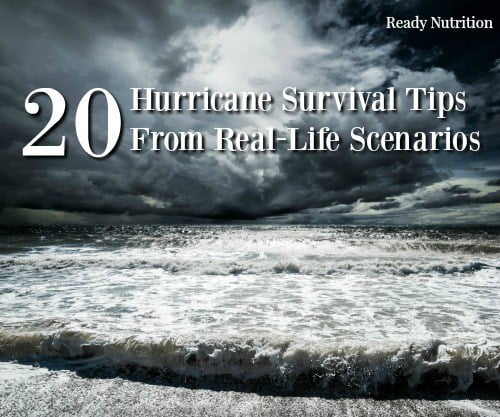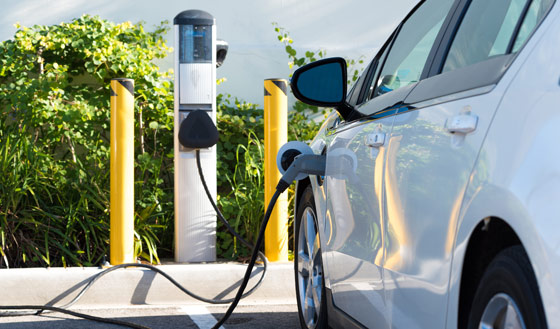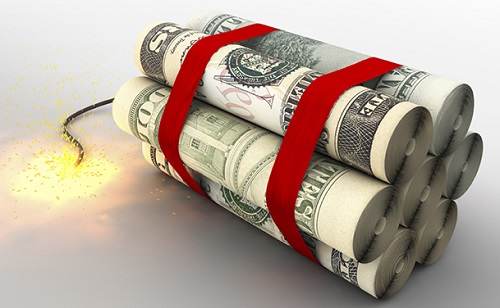This article was originally published by Tess Pennington at Ready Nutrition.
Imagine this scenario: It’s the year 2005 and you are living in the heart of New Orleans. A hurricane is threatening to hit and even though the city sits 8 feet below sea level, you choose not to evacuate or even prepare because you’ve seen many hurricanes threaten to hit the city and it never makes landfall, so why prepare for this one? Days later, your great city is almost completely flooded from Hurricane Katrina and over 1,800 lives were claimed including some of your neighbors because, like you, they decided not to leave the city. Now you are left without electricity, water, and dwindling supplies. To make matters worse, supply trucks are cut off, the police and emergency services can’t meet the needs of the people and there are looters breaking into homes for supplies.

Yes, the above scenario is a worst-case scenario, but aspects of this are very common following hurricanes. These tropical storms are extreme and have the capacity to cripple our entire way of life. They are erratic in nature in terms of where they land, the types of damages sustained, and if there will be disasters in the aftermath, such as water-borne diseases, bug infestations, etc. Because of the unpredictability of these disasters, some choose to be complacent and wait to get preparations in order until the storm is imminent and hours away. While some take this disaster seriously and are meticulous in making preparations each year in case this natural disaster hits. So, which group do you choose to be in?
I’ve been very honest about my ordeals in living through a hurricane and I learned from my mistakes. Long story short, after I went through Hurricane Ike and felt helpless and underprepared, I made it my mission to help others get their homes ready for living in off-grid disasters. We all have a life lesson to share, and I am not alone in trying to get the word out on preparing for these storms. I asked some fellow preppers in the community what advice they would offer on how to better prepare for hurricanes, and the community overwhelmingly stepped up to help their fellow-man. When you read this list, pay attention to recurring advice – prepare ahead of time. This is the key to having all of your preparations in order.
20 Hurricane Survival Tips From Real-Life Scenarios
These are their words and, in my humble opinion, this is some very solid advice to follow.
- Put all of your important documents on a flash drive and put it in your bug out bag. If the time comes and you need to evacuate, you have everything all prepped and ready to go! – Tess Pennington
- My mom had supplies stored in new plastic trash bins. If they needed to bug out, easy to grab and put in the back of the car. Also, the bins would be useful. They also keep things dry. – Judy Keller
- Keep enough cash in your BOB (bug out bag) for at least 1-2 nights in a moderately priced hotel and a few meals. A credit card with a zero or small balance would be beneficial as well. If you forget or lose your wallet, you want a backup method for paying expenses until you can return home. – Jim Cobb
- Well before the back to back hurricanes of 2004 in South Florida, I bought 28 gallons of water. I am glad I did because we had enough water for the police directing traffic. There was a lot we did. Whatever you think is best for your family and communities do it. Friends, coworkers so many lost their homes, businesses and more, so the things I regret not stocking up on are items such as diapers, toothpaste, etc. Essentials for all life is key. – Joanne DeHerrera
- They evacuated us several times after [Hurricane] Charley for Ivan, and people got stuck on the freeway, people died and animals, etc. Ivan hit exactly where they said to evacuate too. We had 6 animals at that time. If I needed to squish them all in the car we would have but there was no gas, so glad there wasn’t. Our circumstances dictate how to respond, however, our gut instinct is always best. -Joanne DeHerrera
- We keep about 30 liters of water on hand at all times. I just save empty 2-liter bottles (the plastic is stable for room temp storage unlike plastic milk jugs) and treat the water using the 2:1 ratio with bleach. 2 drops to 1 liter of water. – Abigail Nicholson
- If you do not have a generator, get one! Have at least enough power to run the washing machine and microwave. A few solar cells to restore cell phone power, charge batteries for radios and flashlights are a must. Don’t forget the toilet paper and enough clean water for everyone in your family for cooking and drinking. You can use pool or rainwater for other purposes. Often overlooked in the city is a chainsaw with fuel mix, bar oil, extra chains. The bulk of damage outside the home is fallen trees. I was blocked in on my cul-de-sac for over a week by fallen oak trees from my neighbor’s yards. – Jim Alkek
- Those little solar lights that go in a garden or along your driveway come in handy to give you some light without candles or lanterns…I charge them up during the day and stick in a flower pot half-filled with rocks…it’s not a lot of light but enough that you can see basically what you are doing. – Sue Heath Reynolds
- Using my daughter’s experience from SC, the last time. In her area, her biggest problem was a lack of utilities because of downed trees and flooding. She had food, but no way to cook it. She has 3 daughters and had no way to bathe them. No light and so on…..it was the simple everyday things that made it hard. – Gary Rosenlieb
- Hurricane veteran here. Each storm is unique but the main thing is to pay attention BEFORE everyone else does…that means at least 5 days in advance having everything in place so that all you have to concentrate on is securing your home. Also, knowing in advance if you will stay or go and LEAVING BEFORE they tell you to. Don’t forget oil (chainsaw/generator), a new chain for chain saw (all of which you should have anyways but most don’t replace); and well just making sure you have 2-3 weeks of supplies in place for being on your own. After several east coast hurricanes, it took WEEKS for stores to be back up and running, even 100 miles outside of the strike zone. Oh, TARPS and bug spray. I am not a bug-out person, can’t really because of animal obligations (15 dogs, chickens, etc) so I have plenty of crates/kennels and such for them to come in (oh yeah baby, ugh, done it before). – Laura Bradley
- Also, a butane burner is great, like a demo chef at a restuarant…they can be used indoors, not expensive and easy to load…at SAMs and many places $22 and a case of fuel (like hairspray cans $12) – Sue Health Reynolds
- Around here, we don’t have to worry about water surging in from the coast, but winds can be an issue. When a hurricane comes, we usually tape the windows in an X or * shape. People closer to the water board up their windows, maybe sandbag around their house. All other preps are the same. Be ready to leave in advance of the storm if it looks like it’s going to make landfall close to home. – Cat Ellis
- Make sure you know all of the available evacuation routes in your area. The main roads and highways will be delayed due to from the heavy traffic flow, so you will want to plan multiple alternative routes in order to ensure that you are not trapped in a flood while attempting to flee the storm. – John Haskell
- Everyone should have these in their EDC/BOB! In a Zip-Lock Freezer bag or waterproof sleeve keep a FAMILY picture, copies of your and your children’s birth certificates…parents/grandparents/guardians/siblings should have a clear picture of children they may have to “claim” because you were not together when a problem occurs. Hopefully, this wouldn’t be necessary for an evacuation type scenario but you just never know. No telling who would be in charge when you arrive to pick up kids…it could be teachers, leaders that don’t know you personally or outsiders from DHS/Law Enforcement/TSA…Heaven forbid…there are no guarantees with anything anymore! I’m sure you can add to the list copies of your vehicle title, home title…things that are irreplaceable! You don’t want to get to bogged down but it’s ultimately important to you…you may someday need proof that it is YOURS!! A flash drive is a great idea but in an extended power outage (EMP/ SHTF) you wouldn’t be able to show someone “the kid is mine”! – Sue Health Reynolds
- Not sure if this was mentioned already but have at least one or two pics of you and your pets together. This will go a long way toward proving ownership should you and your fur babies get separated. – Jim Cobb
- After making it through Hurricane Matthew, flooding, a week without electricity, and 2 weeks without water, I revised my preps slightly and have 3 major priorities here; a lot more water (needed to drink, cook, wash, and flush) extra fuel for cooking (and multiple cooking types we have a propane grill and a fire pit but after a flooding everything too wet) and non-kerosene lamps (after 2 nights cooped up, and unable to ventilate the fumes get to you). – Deborah Middleton
- Put as much as you can in plastic tubs. Especially shoes. Came back after Rita and had a tree through my house. Went right through my closet. No shoes, actually very little of anything. SO PUT AS MUCH IN PLASTIC TUBS AS YOU CAN. Forget the furniture, appliances they can be replaced. – Sue Tidwell
- In case it helps everyone is welcome to download the Hurricane and Evacuation topics (and some others) in PDF from our preparedness book. – Janet Liebsch
- It’s very wise to unpack your BOB every three months or so, minimum once or twice a year. It helps to be sure what is in there…items you decide you don’t really need and more importantly…items you may not have and really should have. WEIGHT…it’s also important to put those suckers on and see if you can actually carry it better yet we need to be walking with them ON physical fitness should be one of our number one preparedness priorities…as I point a finger at MYSELF. – Sue Heath Reynolds
- Prepare to defend your home at all costs. You don’t know how long the grid will be down and there will be looters. – Mac Slavo
These pieces of advice are all from those who have lived through this ordeal. They shared their stories because they want to help others prepare and get ready – listen to them. If you need a guide to help you in your preparations, consider The Prepper’s Blueprint to get you disaster-ready – step-by-step. Do not wait until the last minute to prepare or the items you need to live through this ordeal will be limited.
If you live in a highly-populated area, understand that resources will diminish quickly, so preparing beforehand can circumvent this. You can always start out with these basic preparedness items to get through a disaster:
- Food and alternative ways to cook food
- Water – 1 gallon per person/per day for consuming only. Plan more for sanitary needs.
- Fuel for generators. Also, consider charcoal for outdoor grills
- Batteries and battery charger
- Flashlights and lanterns
- Generator
- Emergency lighting
- Ice
- Medical supply
- Items for baby needs
- Sanitation supplies
Ultimately, you are the only one who can best care for your family. Having a stash of your family’s favorite canned or dry goods, a supply of water and a simple medical kit can maintain your basic needs for a short-lived disaster. This simple preparedness supply could set you apart from the unprepared. If you live in an area prone to hurricanes, now is the time to prepare. Listen to the advice of your fellow man.










0 Comments